Are you a dedicated cat parent curious about your feline friend’s health and well-being? One common question that often arises is, Do cats get colds? Understanding the dynamics of cat colds is not just a matter of curiosity; it holds significant relevance for cat owners keen on ensuring their pets lead happy and healthy lives.
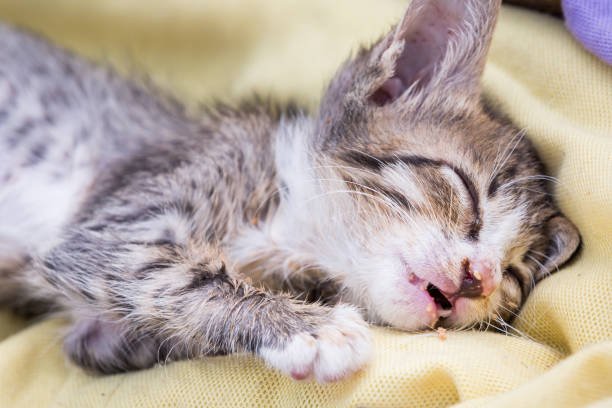
Today, let’s explore an important question about our feline friends: Can cats get colds? Understanding this is more than just curiosity; it’s essential for every cat owner. In this article, we’ll dig into the details of cat colds, looking at signs that may show your kitty isn’t feeling well. The goal is to provide a straightforward guide, giving you the knowledge to take good care of your cat. Let’s unravel the mystery of cat colds together, so you can keep your furry friend healthy and happy.
Causes of Cat Colds
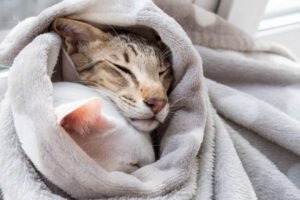
When it comes to cat colds, two primary culprits often take the spotlight: feline herpesvirus (FHV-1) and feline calicivirus (FCV). These highly contagious viruses are responsible for a significant portion of respiratory infections in cats. Feline herpesvirus, in particular, is known for causing upper respiratory issues, while feline calicivirus can manifest as a variety of symptoms, ranging from mild cold-like signs to more severe conditions.
Apart from these viral agents, bacterial infections can also contribute to cat colds. Bordetella bronchiseptica and Chlamydophila felis are two bacterial species commonly associated with respiratory problems in cats. While less frequent, they can play a role in exacerbating the severity and duration of a feline cold.
Environmental factors also come into play. Stress, overcrowded living conditions, poor ventilation, and exposure to cigarette smoke are among the external elements that may weaken a cat’s immune system, making them more susceptible to infections.
Understanding this multifaceted range of causes is crucial for cat owners striving to create a healthy living environment for their pets.
Symptoms of Cat Colds
Recognizing the symptoms of a cat cold is essential for proactive care and early intervention. Cats may exhibit a range of observable signs when battling a cold; understanding these symptoms is crucial for attentive cat owners. Here are some common indicators:
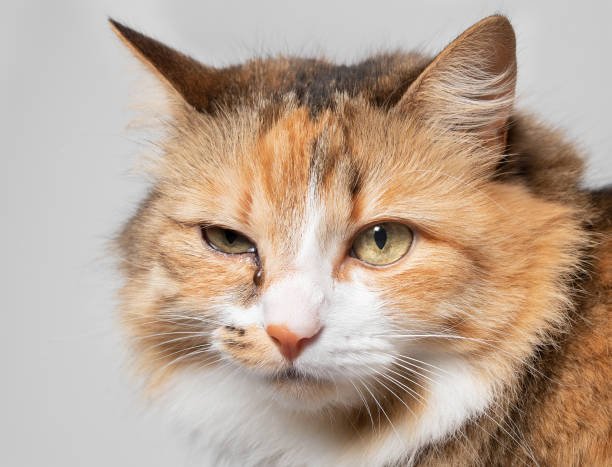
Sneezing: Cats with colds often experience frequent and sudden bouts of sneezing. If you notice your feline friend sneezing more than usual, it could be an early sign of a respiratory issue.
Runny Nose: A runny or congested nose is another prevalent symptom. You might observe nasal discharge, which can range from clear to thick and colored, depending on the severity of the infection.
Watery Eyes: Cats with colds may develop watery or teary eyes. This can contribute to a squinting appearance, and you might notice more tear staining around their eyes than usual.
Lethargy: One of the most noticeable signs is a decrease in energy levels. Cats with colds often become lethargic, showing less interest in their usual playful activities.
It’s important to note that while these symptoms bear some resemblance to human colds, there are distinctions in how they manifest in cats. Cats typically don’t experience a fever with a cold, unlike humans. Additionally, the severity and duration of symptoms can vary among individual cats.
Diagnosis and Veterinary Consultation
While a keen eye for symptoms is invaluable, the expertise of a veterinarian is essential for a precise diagnosis when suspecting a cat cold. The importance of consulting a veterinarian cannot be overstated, as they play a pivotal role in determining the specific cause of your cat’s respiratory distress and formulating an effective treatment plan.
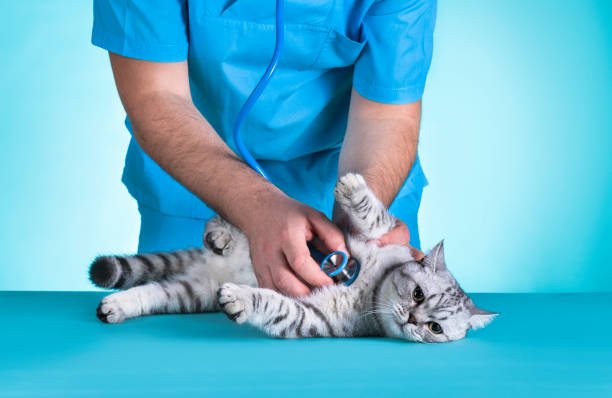
Importance of Veterinary Consultation:
- Accurate Diagnosis: Veterinarians have the knowledge and tools to accurately diagnose the underlying cause of your cat’s cold symptoms. This is crucial for tailoring an appropriate treatment strategy.
- Differentiation from Other Conditions: Respiratory issues in cats can stem from various causes. Your veterinarian can differentiate between viral, bacterial, and environmental contributors, ensuring targeted and effective intervention.
- Preventive Measures: Veterinary consultations provide an opportunity for discussing preventive measures. Vaccinations, proper nutrition, and environmental adjustments can be recommended to safeguard your cat’s health.
What to Expect During a Vet Visit:
- Physical Examination: The veterinarian will conduct a thorough physical examination, paying attention to your cat’s respiratory system, eyes, and overall health.
- Medical History: Providing a comprehensive medical history, including the onset and progression of symptoms, any recent changes in the cat’s environment, and vaccination records, aids in the diagnostic process.
- Diagnostic Tests: Depending on the severity of symptoms, your veterinarian may recommend diagnostic tests such as blood work, nasal or ocular swabs, or imaging studies to identify the specific pathogen causing the infection.
- Discussion of Treatment Options: Upon diagnosis, the veterinarian will discuss treatment options. This may include antiviral or antibacterial medications, supportive care, and advice on managing the cat’s environment for optimal recovery.
By consulting a veterinarian promptly, you ensure the best possible care for your cat. Early intervention not only alleviates current symptoms but also prevents potential complications.
Treatment and Care
When caring for a cat with a cold, a combination of supportive measures and prescribed medications can aid in a comfortable and speedy recovery:
Supportive Care:
- Hydration: Ensure your cat stays hydrated by offering water and possibly wet food or diluted broth.
- Comfortable Environment: Provide a quiet, warm, and well-ventilated resting space, possibly using a humidifier for added comfort.
- Nutritious Diet: Offer a palatable and nutritious diet to support your cat’s immune system.
Prescribed Medications:
- Antiviral Medications: For viral infections like feline herpesvirus, antiviral medications may be prescribed.
- Antibiotics: If a bacterial infection is suspected, antibiotics may be necessary.
- Eye Drops or Ointments: To address eye symptoms, your veterinarian may recommend specific treatments.
Stress the Significance of Hydration and Comfort:
- Hydration is Key: Emphasize the importance of adequate water intake to prevent dehydration.
- Comfortable Resting Area: Provide a cozy and draft-free space for your cat to rest.
- Monitoring Well-being: Keep a close eye on your cat’s overall health, seeking prompt veterinary advice if symptoms persist or worsen.
By combining these elements of care, you can support your cat’s recovery effectively. Consistent adherence to prescribed medications, maintaining hydration and ensuring a comfortable environment are key factors in helping your feline friend bounce back from a cold.
Preventive Measures
Maintaining your cat’s health involves proactive steps to prevent colds and respiratory issues. Here are practical tips:
Vaccinations:
- Regular Vet Visits: Ensure routine veterinary appointments for timely vaccinations, including those targeting feline herpesvirus and calicivirus, to reduce the risk of respiratory infections.
Clean Environment:
- Regular Cleaning: Keep your cat’s surroundings clean by routinely cleaning litter boxes, bedding, and toys to minimize potential sources of infection.
- Good Ventilation: Ensure proper ventilation at home to reduce airborne irritants that may contribute to respiratory problems.
Healthy Lifestyle:
- Balanced Diet: Provide a nutrient-rich diet to support your cat’s immune system. Consult your vet for dietary advice.
- Regular Exercise: Encourage play and exercise to boost overall health.
Regular Vet Check-ups:
- Early Detection: Schedule regular veterinary check-ups for early detection of potential health issues.
- Tailored Preventive Plans: Collaborate with your vet to create a personalized preventive care plan based on your cat’s age, lifestyle, and medical history.
Incorporating these measures into your cat’s routine helps reduce the risk of respiratory issues.
Signs of Severe Conditions
Difficulty Breathing: Labored breathing, rapid breathing, or open-mouth breathing signals a severe respiratory issue.
Persistent Coughing: Chronic or intense coughing may indicate a more serious problem.
Lack of Appetite: If your cat refuses to eat or drink for an extended period, it’s a red flag that requires immediate veterinary attention.
Discharge Changes: Any change in the color or consistency of nasal or eye discharge can be a sign of complications.
In conclusion, understanding if cats get cold is vital for responsible pet ownership. By focusing on preventive measures, including vaccinations and maintaining a clean environment, cat owners can minimize the risk. Recognizing the signs of cat colds and seeking prompt veterinary attention for severe symptoms ensures the well-being of our feline friends. So, the next time you wonder, Do cats get colds? remember, awareness and proactive care are the keys to keeping our beloved cats healthy and happy.
FAQ’s
Q: Do cats get colds, and is it similar to what humans experience?
A: Yes, cats can get colds, but the viruses affecting them are different from those that affect humans. The symptoms may include sneezing, a runny nose, and lethargy.
Q: How can I tell if my cat has a cold?
A: Look out for signs such as sneezing, watery eyes, and a change in energy levels. If you’re wondering, “Do cats get colds?” these symptoms might be an indicator.
Q: Can I give my cat over-the-counter cold medicine if they have a cold?
A: It’s not advisable. Human cold medications may not be safe for cats. Always consult with a veterinarian for appropriate treatment options.
Q: Are there preventive measures to keep my cat from getting colds?
A: Yes, keeping up with vaccinations, maintaining a clean living environment, and regular veterinary check-ups are effective ways to minimize the risk. Wondering, “Do cats get colds?” Prevention is key!
Q: Should I be concerned if my cat’s cold symptoms persist?
A: Yes, persistent symptoms may indicate an underlying issue. If you’re asking yourself, “Do cats get colds for an extended period?” it’s crucial to consult with a vet for a thorough evaluation.
Q: Can I catch a cold from my cat?
A: No, the viruses causing colds in cats are typically specific to felines and do not pose a risk to humans. If you’re worried about cross-species transmission, it’s generally not a concern.
Resource's
American Society for the Prevention of Cruelty to Animals (ASPCA):
- Website: ASPCA
- The ASPCA often provides information on pet care, including articles on cat health and behavior. Use the search function to find articles related to cats and cold weather.
The Humane Society of the United States:
- Website: The Humane Society
- The Humane Society offers resources and articles on various topics related to pet care, including how to keep pets safe in different weather conditions.
Veterinary Information Network (VIN):
- Website: VIN
- VIN is a professional veterinary community that provides access to articles, forums, and resources written by veterinarians. You may find discussions or articles related to the impact of cold weather on cats.
American Veterinary Medical Association (AVMA):
- Website: AVMA
- AVMA publishes articles on pet health and wellness, including how to care for pets in different climates and weather conditions.
Cornell Feline Health Center:
- Website: Cornell Feline Health Center
- Cornell University’s Feline Health Center provides information on various aspects of cat health, including how weather affects cats and what precautions owners can take.
PetMD:
- Website: PetMD
- PetMD offers articles and resources on pet health and wellness, including tips for keeping cats comfortable in different weather conditions.
Do cats get colds? – Wags & Wiggles: Rescue a Pet, Change a Life
Cats and Colds: More Than Just Sneezes and Sniffles
cats can catch colds! Just like us, they experience upper respiratory infections that share many of the same symptoms as a human cold
Flipboard
Choosing The Right Dog For Your Lifestyle: A Tail-Wagging Decision
Do Cats Get Cold? Understanding Feline Comfort In Chilly Weather
The Impact Of Cold On Cat Health
Brrr! How Cold Weather Can Affect Your Cat’s Health
Feeling The Chill: How Cold Weather Affects Your Cat’s Health
Storeboard

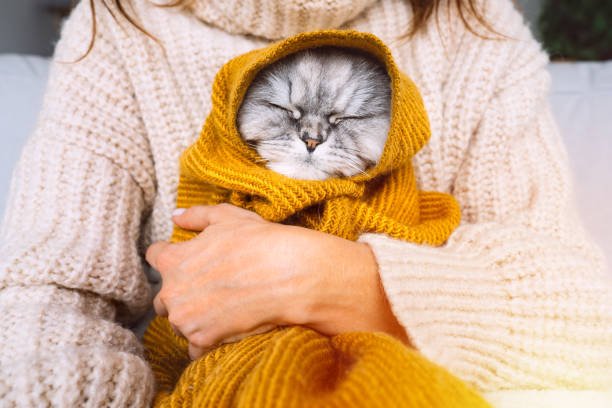












1 Comment